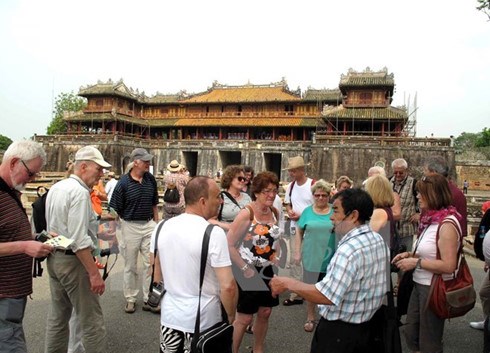In the three-day New Year holiday from December 30, 2017 to January 1, 2018, the site welcomed nearly 31,000 tourists, of which 80 percent were foreigners.
The Republic of Korea was the biggest source market, with 207,783 visitors to the site, accounting for 25.5 percent. It was followed by France (9.6 percent), the UK (6.2 percent), the US (5.9 percent); and Germany (4.1 percent).
    |
 |
| Photo: vietnamtourism.gov.vn |
Director of the Hue Monuments Conservation Center Phan Thanh Hai said, in recent years, the Hue imperial relic site has welcomed more and more tourists, reflecting its attractiveness, particularly the signature tour of “Hue-One destination- Five heritages”, including the complex of Hue ancient capital, Hue royal court music, moc ban (wood blocks) and chau ban (imperial archives) of the Nguyen Dynasty, and poetry in Chinese-language scripts on Hue royal architecture which was recognized as world documentary heritage by UNESCO.
In 2017, the center launched the program “Dai Noi by night”, serving 28,000 tourists, and generating over VND 3 billion (USD 132,000).
It also earned over VND 16 billion (USD 704,000) from services offered at the site in the year.
Over VND 176 billion (USD 7.74 million) was spent on upgrading and maintaining the site’s landscapes, such as Tang Tho palace, the Temple of Literature, Truong Co tomb, and the Hon Chen shrine. Nearly VND 150 billion (USD 6.6 million) has been disbursed, accounting for 84.97 percent of its plan.
The center welcomed 21 international delegations to the cultural and historical exchanges held in the year, with the highlight of the visit of the Japanese Emperor and Empress to the Hue ancient citadel.
International cooperation was also strengthened in upgrades and maintenance work.
In 2018, the provincial tourism sector hopes to welcome between 4 – 4.2 million visitors, of which foreigners make up of 40-45 percent, up 10 percent and 12 percent from 2017, respectively, generating VND 4 – 4.2 trillion (USD 176 million – 184.8 million).
Source: VNA